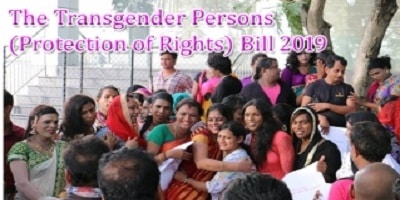On August 5, 2019, Lok Sabha passed the Transgender Persons (Protection of Rights) Bill, 2019 by a voice vote. It was introduced in the Lok Sabha on July 19, 2019 by the Minister for Social Justice and Empowerment, Mr. Thaawarchand Gehlot. The Bill defines a transgender person as one whose gender does not match the gender assigned at birth and according to 2011 Census, there are more than 4.80 lakh transgenders in India.
Key Points:
- Prohibition against discrimination: The Bill prohibits any kind of discrimination against a transgender person.
- Right of residence: Every transgender person shall have a right to reside and be included in his household. If the immediate family is unable to care for the transgender person, the person may be placed in a rehabilitation centre, on the orders of a competent court.
- Employment: No government or private entity can discriminate against a transgender person in employment matters, including recruitment, and promotion.
- Education: Educational institutions funded or recognized by the relevant government shall provide inclusive education, sports and recreational facilities for transgender persons, without discrimination.
- Health care: The government must take steps to provide health facilities to transgender persons including separate HIV (Human Immunodeficiency Virus) surveillance centres, and sex reassignment surgeries.
- Certificate of identity for a transgender person: A transgender person may make an application to the District Magistrate for a certificate of identity, indicating the gender as ‘transgender’. A revised certificate may be obtained only if the individual undergoes surgery to change their gender either as a male or a female.
- Welfare measures by the government: The relevant government will take measures to ensure the full inclusion and participation of transgender persons in society.
- Offences and penalties: The Bill recognizes the offences against transgender persons like: forced or bonded labour (excluding compulsory government service for public purposes), denial of use of public places, removal from household, and village, physical, sexual, verbal, emotional or economic abuse. Penalties for these offences vary between 6 months and 2 years, and a fine.
- National Council for Transgender persons (NCT): The NCT will consist of: Union Minister for Social Justice (Chairperson); Minister of State for Social Justice (Vice- Chairperson); Secretary of the Ministry of Social Justice; one representative from ministries including Health, Home Affairs, and Human Resources Development. Other members include representatives of the NITI Aayog, and the National Human Rights Commission. State governments will also be represented. The Council will also consist of 5 members from the transgender community and 5 experts from non-governmental organisations.
- Removal of begging: A contentious provision that criminalized begging by transgender people has been removed from the bill.
AffairsCloud Recommends Oliveboard Mock Test
AffairsCloud Ebook - Support Us to Grow
Govt Jobs by Category
Bank Jobs Notification




